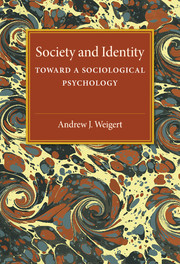Book contents
- Frontmatter
- Contents
- Preface
- Part I The story of whence identity and a step toward theory
- 1 Identity: its emergence within sociological psychology
- 2 Sociological psychology and identity theory: a propositional essay
- Part II So what? Applying and extending identity theory, and back to society
- Bibliography
- Index
2 - Sociological psychology and identity theory: a propositional essay
Published online by Cambridge University Press: 05 May 2010
- Frontmatter
- Contents
- Preface
- Part I The story of whence identity and a step toward theory
- 1 Identity: its emergence within sociological psychology
- 2 Sociological psychology and identity theory: a propositional essay
- Part II So what? Applying and extending identity theory, and back to society
- Bibliography
- Index
Summary
In Chapter 1, we traced the emergence of identity as a central concept in sociological social psychology. Although its authoritative history is yet to be written, the concept clearly arises from the work of Erik Erikson. From there, it spread as a technical, clinical, and folk term. To scholars working in the symbolic interaction tradition within sociology, it showed promise of significant analytic power. Yet as one of these scholars, Anselm Strauss, noted in the opening line of his influential work Mirrors and Masks (1959, reissued 1971), “Identity as a concept is fully as elusive as is everyone's sense of his own personal identity.” The first chapter tried to diminish that elusiveness somewhat.
The seminal question
The human quest to answer the seminal question, What is a human being that we are mindful of ourselves and of one another? demands constant attention. Thinkers try to answer the question from the symbols historically available to them. Traditionally, answers came from mythical, religious, theological, humanistic, philosophical, and everyday world views. In the past century, the rise of psychological and social sciences provided yet other symbols and models for addressing this question. After World War II, the English-speaking world formulated the seminal question in terms of individual identity from the psychological tradition, and social identity from the sociological tradition. “Identity” became the translation of this era's answer to the seminal question.
Although identity emerged as a concept that spans psychological, sociological, historical, theological, and philosophical disciplines, this chapter focuses on human identity as a construct within a sociological social psychology.
- Type
- Chapter
- Information
- Society and IdentityToward a Sociological Psychology, pp. 30 - 64Publisher: Cambridge University PressPrint publication year: 1986

